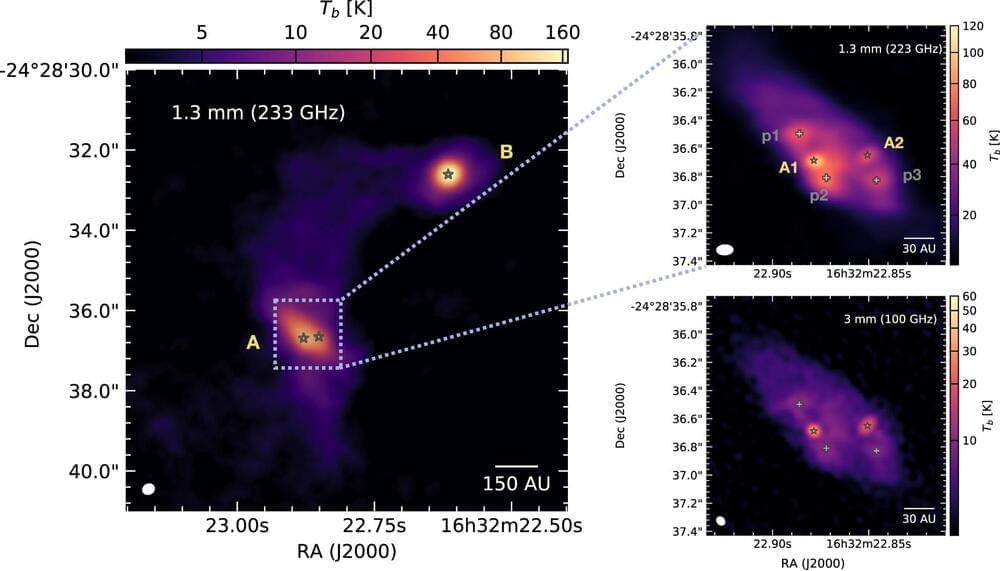Archive for the ‘physics’ category: Page 115
Dec 29, 2022
Action of two protostars appears to be making conditions right for planet formation
Posted by Genevieve Klien in categories: physics, space
A team of researchers at Max Planck Institute for Extraterrestrial Physics, working with a colleague at the University of Texas at Austin and another from Green Bank Observatory in West Virginia, has found evidence of ripe conditions for planet formation in the vicinity of two closely orbiting protostars.
In their paper published in The Astrophysical Journal Letters, the group describes their observations and outline what might be learned from future study of the star system.
The work by the team on this new effort came on the heels of work done by another team that discovered a pair of protostars still in the very early stages of their development—in their first 500,000 years of existence. In this new effort, the researchers have taken a closer look at the two protostars and also the environment in which they exist.
Dec 29, 2022
Where Are All The Aliens? | Tim O’Brien | TEDxOldham
Posted by Dan Breeden in categories: alien life, physics

We now know of thousands of planets orbiting other stars. But we know of only planet that hosts life – the Earth.
Most scientists think that life elsewhere in the Universe is likely to exist, but so far there is no evidence that extra-terrestrials exist or that they have visited us. However, we can search for signs of life on distant planets and we are even using radio telescopes to look for messages sent to us by extra-terrestrial civilisations. In this talk Tim will discuss the latest science behind the search for alien life.
Tim is a Professor of Astrophysics and an Associate Director of Jodrell Bank Centre for Astrophysics at The University of Manchester.
Continue reading “Where Are All The Aliens? | Tim O’Brien | TEDxOldham” »
Dec 28, 2022
“A Big Deal” — Physicists Solve 20-Year Mystery of Stable Chiral Nanostructures
Posted by Paul Battista in categories: computing, information science, nanotechnology, physics
Researchers have finally succeeded in building a long-sought nanoparticle structure, opening the door to new materials with special properties.
Alex Travesset does not have a sparkling research lab stocked with the most cutting-edge instruments for probing new nanomaterials and measuring their unique properties.
Instead of using traditional laboratory instruments, Alex Travesset, a professor of physics and astronomy at Iowa State University and an affiliate of the U.S. Department of Energy’s Ames National Laboratory, relies on computer models, equations, and figures to understand the behavior of new nanomaterials.
Dec 26, 2022
One of Earth’s most powerful observatories could detect warp drives
Posted by Atanas Atanasov in categories: physics, space travel

Trans-light speed vessels should give off gravitational waves.
This discovery confirmed a prediction made a century before by Einstein and his Theory of General Relativity and opened the door to a whole new field of astrophysical research.
Dec 26, 2022
J. Robert Oppenheimer cleared of “black mark” against his name after 68 years
Posted by Quinn Sena in categories: physics, security

😗
Nearly 70 years after having his security clearance revoked by the Atomic Energy Commission (AEC) due to suspicion of being a Soviet spy, Manhattan Project physicist J. Robert Oppenheimer has finally received some form of justice just in time for Christmas, according to a December 16 article in the New York Times. US Secretary of Energy Jennifer M. Granholm released a statement nullifying the controversial decision that badly tarnished the late physicist’s reputation, declaring it to be the result of a “flawed process” that violated the AEC’s own regulations.
Continue reading “J. Robert Oppenheimer cleared of ‘black mark’ against his name after 68 years” »
Dec 25, 2022
New Superluminal Theory Transforms Our Concept of Time with “Extension” of Special Relativity
Posted by Paul Battista in categories: physics, space
Theoretical physicists from Warsaw and Oxford universities argue that a superluminal world possessing three temporal dimensions and one dimension in space could potentially change our concept of time, according to a new paper.
The researchers involved say they have developed “an extension of special relativity” that incorporates three individual time dimensions with a single space dimension, which helps explain how observations made by “superluminal” observers—inertial observers moving faster than the speed of light—might appear.
Within such a framework, the researchers argue that spontaneous events that can occur in the absence of a deterministic cause and other strange phenomena would be experienced by observers moving faster than the speed of light within a vacuum, concepts that potentially transform our concept of time as we know it.
Dec 23, 2022
OpenAI ChatGPT: The Future Is Here!
Posted by Kelvin Dafiaghor in categories: habitats, information science, physics, robotics/AI

❤️ Check out Weights & Biases and sign up for a free demo here: https://wandb.com/papers.
❤️ Their mentioned post is available here: http://wandb.me/RLHF-OpenAI
Try #ChatGPT!
https://chat.openai.com/
https://openai.com/blog/chatgpt/
Dec 22, 2022
Physics Suggests Our Dreams Could Be Glimpses Into Alternate Dimensions
Posted by Shubham Ghosh Roy in category: physics

Most theories touch on how there are many different worlds, universes, dimensions, or whatever you would like to call them. Each one the same as our own, but also different in some way. For instance, in another world, you might be living the same life as you are now but perhaps politics had gone in a different direction. Maybe all of the presidents that were elected here in the US were opposite from how they are in our world. Maybe everything is the same except for you have different colored hair? The differences between worlds could be minuscule or extreme, it all varies.
While throughout the years many physicists and researchers, in general, have been trying hard to prove the existence of this kind of thing, it has proven to be quite the task. That being said, the concept itself has not been disproven. Now, what this article is about is a concept many do not realize is quite prevalent in these theories. We are all connected to these other worlds or universes. Each one might be separate from our own, but it has been suggested time and time again that when we experience things like déjà vu or peculiar dreams, we are getting a glimpse into one of these other worlds.
Continue reading “Physics Suggests Our Dreams Could Be Glimpses Into Alternate Dimensions” »
Dec 22, 2022
The Biggest Discoveries in Physics in 2022
Posted by Paul Battista in categories: physics, space

In a year filled with sweet new observations in astronomy and tantalizing breakthroughs in condensed matter physics, the brand-new space telescope takes the cake.











